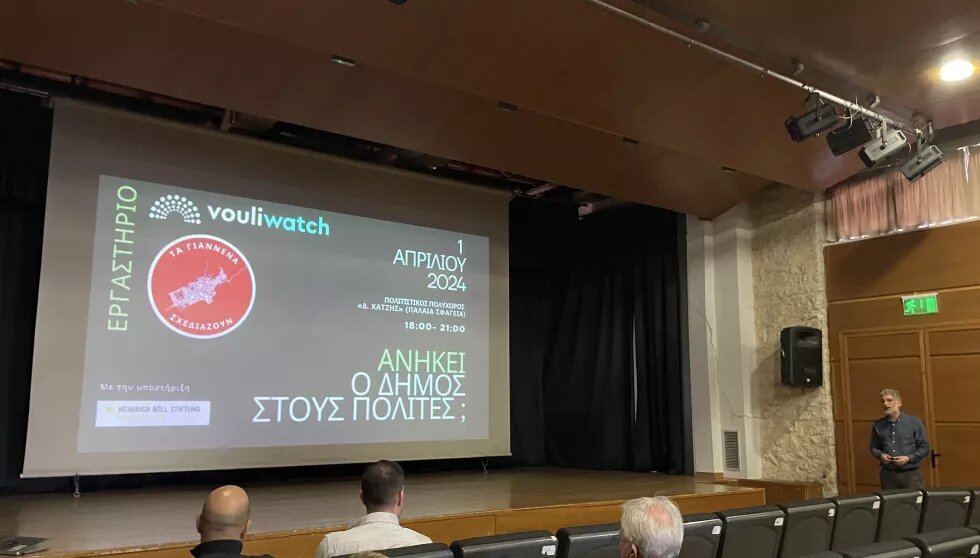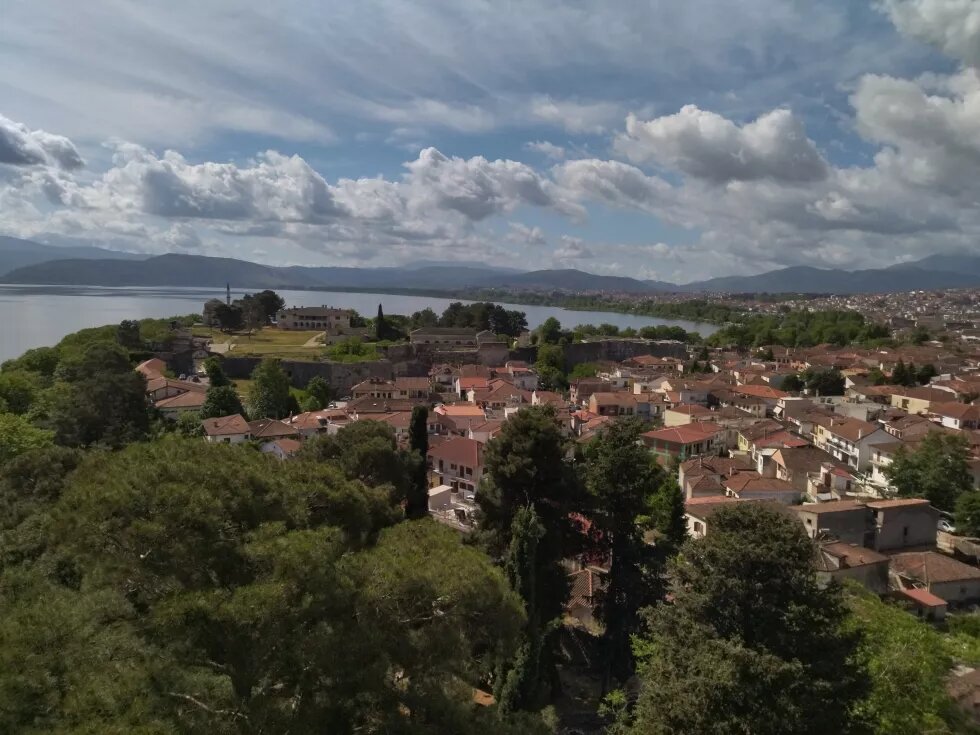
The relationship between municipalities and citizens, the challenges inherent in that relationship, and potential ways to address them were the central themes of the workshop-event titled “Does the municipality belong to the citizens?”. The event took place on April 1, 2024, in Ioannina, at the cultural center “Dimitris Chatzis”, and was organized by the project “Ioannina is planning”, in collaboration with the participatory platform Localwatch and with the support of the Heinrich Böll Foundation.
The event was attended by members of the local Social Solidarity Economy (SSE) ecosystem, representatives from scientific and research collectives, members of municipal political groups, as well as current and former officials of the Ioannina municipal authorities, along with several citizens. The active role played by the association “Commons of Ioannina”, which is linked to –without overlapping– the “Ioannina is planning” project. The event was introduced by Nikiforos Papachristos, Business Human Resources Consultant at the Public Employment Service.

The event specifically included the presentation of the results of a survey on participatory processes within the Municipality of Ioannina, a detailed presentation of two case studies illustrating how citizen participation in decision-making processes can be enhanced, and a workshop focused on building relationships of trust and cooperation between the municipality and its citizens.
Citizens dissatisfied with transparency and participation issues
The results of the survey on open governance, citizen satisfaction with their relationship with municipalities, and their ability to participate in planning processes were presented by Vasilis Floudas, a PhD candidate at the Department of Architectural Engineering, Democritus University of Thrace. The survey was conducted between March 14 and 31, 2024, using a questionnaire format, and included responses from 414 citizens of Ioannina (53,6% women and 46,4% men). Some of its interesting results include:
- Most respondents said the Municipality knows “little or nothing” about citizens' needs.
- One in two citizens reported being very dissatisfied with transparency in the Municipality of Ioannina.
- Most respondents said that the Municipality does not sufficiently support open governance (regarding equal opportunities, transparency, participatory processes).
- Six out of ten citizens do not believe there are opportunities to participate in municipal decision-making.
- Very few citizens watch the City Council meetings, which are available via live online broadcasts.
- In addition, most respondents said they communicate with municipal services by phone, fewer by email, and very few by appointment.
Localwatch – a digital meeting point between municipalities and citizens
The second part of the event focused on ways to strengthen citizen participation in decision-making processes. One such method is the participatory democracy platform Localwatch, which was introduced to the audience by Stefanos Loukopoulos, director of Vouliwatch. Indeed, Localwatch is a platform modeled after Vouliwatch, aiming to act as a “bridge of communication, monitoring, and participation between citizens and their municipalities”. It is currently being piloted in Greece’s four largest municipalities: Athens, Thessaloniki, Heraklion, and Patras.
The platform includes a variety of functions and capabilities designed for both citizens and elected officials. Among the features it provides are profiles of elected representatives and declarations of assets of mayors while it also enables users to evaluate municipalities, submit budget utilization proposals, etc. Additionally, the platform may include statistical data derived from responses by municipal political groups, information on key issues that concern citizens, Q&As between residents and officials, etc. “Essentially, the platform enables dialogue and participation in a ‘protected’ environment, compared for example to the interaction between municipalities and citizens on social media”, Mr. Loukopoulos emphasized.
In short, Localwatch operates as a “meeting point” and space for dialogue between the municipality and its citizens, which can host questions and answers, well-documented proposals, petitions addressed to the municipality, proposals for budget allocation, proposals for specific volunteer activities, evaluations and feedback regarding all municipal functions (services, departments, deputy mayor sectors, etc.). In any case, the platform’s completeness and success depend both on the municipality’s willingness to contribute data and on the citizens’ participation. It is also up to the municipality whether to maintain the platform in an informal character or to turn it into an official space for receiving proposals and comments.
Localwatch is an application developed by Vouliwatch in partnership with Commonspace, within the framework of the Active Citizens Fund program. This €13,5 million program is funded by Iceland, Liechtenstein, and Norway, and is part of the European Economic Area (EEA) financial mechanism for the 2014-2021 period, commonly known as EEA Grants.
Karatassiou Park: The neighborhood organizes and asserts its rights institutionally
Another instance of citizen participation in decision-making processes was thoroughly presented by Socratis Seitanidis, a spatial and urban planner from the Region of Central Macedonia and a PhD holder from the Aristotle University of Thessaloniki. Mr. Seitanidis specifically introduced a case study: Karatassiou Park –a former military camp located in the Municipality of Pavlos Melas, Thessaloniki– and its redevelopment, and the pivotal role played by the Neighborhood Urban Planning Committee (NUPC) of Karatassiou Park.
At the beginning of his presentation, he revisited the legal tools available for citizen involvement in various local self-governing functions and decisions. He referred specifically to local referendums, a legislative initiative that was never practically implemented from its establishment in 2018 until its repeal in 2020, as well as to various committees, such as municipal consultation committees. Although these are defined by law as participatory processes, they are rarely convened, especially in smaller municipalities. He said characteristically: “Too much bureaucracy, limited effectiveness”.
However, the case of Karatassiou Park demonstrated the dynamic potential of citizen movements that can be very effective in everyday life. As Mr. Seitanidis said, the pressure exerted by citizens through their organized interventions in the area itself and at the local municipality, finally resulted in the appointment of a deputy mayor especially assigned to the project, even though the municipal authority followed a different political direction.
Also, in 2021, it was decided that the site will not be used for commercial purposes but would be designated as a green and public space, as outlined in the General Urban Plan (GUP) of Polichni, which was published in the Government Gazette on July 26, 2021. Specifically, the General Urban Plan stipulates that at least 75% of the total area of the metropolitan park to be developed there will consist of green space, while the remaining area will accommodate public welfare facilities (healthcare, sports, culture, education). Within this framework, part of the former military camp was allocated to the Ministry of Health for the construction of an oncology hospital, along with “ancillary uses” such as a parking lot and a metro station.
The role of the Neighborhood Urban Planning Committee (NUPC) has been, and continues to be, crucial in all these developments. The NUPC is an institutional body with designated responsibilities, where decisions are made by consensus. It was established by the decision of the municipal council of the Municipality of Pavlos Melas, as stipulated by the relevant legislation, and is composed of associations and collectives. The NUPC can issue advisory opinions on matters related to the design and management of the park, convene open citizen assemblies, and ensure the implementation of the provisions outlined in the General Urban Plan.
Another point of interest was the mention of the demands put forward by the Ministry of National Defense, given that Karatassiou Park is a former military camp. A reasonable comparison was drawn with the case of the Velissariou military camp in Ioannina and the possibility of its transfer to the Municipality of Ioannina, a case that is quite old and has many particularities, some of which are analogous to those of the former Karatassiou camp.
The event concluded with a workshop that followed the “World Café” methodology, focusing on the ability of municipalities and citizens to build trust and cooperative relationships in a reciprocal manner.
Through such events and workshops, the public in Greece is gradually becoming familiar with the concept of participation, a concept that, until recently, existed mainly in academic literature but is now slowly beginning to permeate everyday culture and practice.





